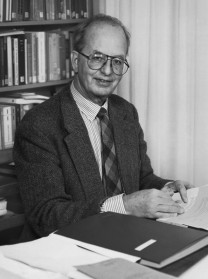* 1924 + 1992
Eike Haberland was born in Detmold in 1924. He grew up in Nauen and Potsdam. He finished school in 1942. Between 1946 and 1950 Haberland studied Anthropology, Ancient Philology, Ancient History and Oriental Studies at the Johann Wolfgang Goethe-University in Frankfurt/Main. Moreover he attended courses on Religious Studies and African Linguistics. Adolf Jensen was among his teachers.
In 1950 Haberland graduated and did his first field research in Ethiopia, followed by further researches throughout the following decades (e.g., in 1954/55, 1967, 1970/71). In 1962 Haberland completed his habilitation thesis and eventually did field researches in New Guinea. Moreover, he took up a position at the Department of Anthropology and African Studies in Mainz in 1965.
In 1968 Haberland returned to Frankfurt and not only took up a professorship at the Johann Wolfgang Goethe-University but also became head chairman of the Frobenius-Institute.
Haberland was not only interested in non-literate cultures outside Europe but also had a strong interest in cultural-historical research methods. He emphasized the importance of studying a wide range of source material, which both includes the emic and etic perspectives. Moreover, the knowledge of local languages and the collaboration with other sciences, such as archaeology, to him were necessary for a profound anthropological work.
Eike Haberland died in 1992.
(Text by Vincenz Kokot (2011) based on an article at wikipedia.de, photography by courtesy of Frobenius-Institute)


